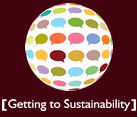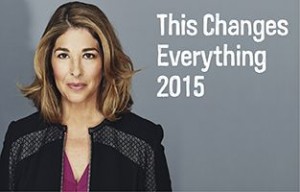by Peter Burdon
Discussions at the Paris climate talks take place within incredibly narrow parameters. In fact, it would not be too great an exaggeration to say that the summit’s main purpose is to send the private sector a message about which way it should steer its future investments.
The financial press tends to be the most explicit on this point. The Financial Times, for instance, described the purpose of the Paris summit like this:
Investors will need to be persuaded that governments are going to make it easier for them to make money from a new electric bus system or a wind farm rather than a highway or a coal power plant.
I am under no illusion about the scale of business investment required to help developing countries move to low-carbon energy sources.
But by narrowing the conversation to neoliberal, market-based solutions, we risk ignoring other opportunities for social and environmental change. This is particularly true under the current state of emergency in France, which has silenced alternative or opposing voices.
These concerns are shared by the Canadian author and activist Naomi Klein, who this week (alongside her compatriots, the film-maker Avi Lewis and author Maude Barlow) came to Paris to present her Leap Manifesto – featuring strategies for a just transition away from fossil fuels.
Lewis opened proceedings by noting, “there is a huge gap between what we are offered by political leaders and what we are ready for in terms of bold and radical change”, before Klein added:
I refuse to leave our future in the hands of world leaders cloistered in Le Bourget [the location of the climate conference]. People are ready to leap and lead. We need politicians who are ready to listen and follow.
The Manifesto
Klein described the manifesto as a “nuts-and-bolts policy document” that seeks to bring together diverse movements to fight for a “justice-based transition away from fossil fuels”. The document itself is an example of this approach, having been drafted by 60 representatives from Canada’s indigenous nations, faith groups, environmental groups and the labour movement.
It contains several substantive ideas, including respecting indigenous rights, giving the public control of energy systems, funding clean transport, ending fossil fuel subsidies, and scrapping laws that prevent attempts to rebuild local economies and stop damaging extractive projects.
With respect to the energy transition, Klein underlined the importance of programs that empower first nations communities to own and control local initiatives. Citing positive examples from Alberta’s tar sands region, she argued that transition can be a “concrete way to fight climate change while addressing historical wrongs”.
Canada’s newspaper of record, The Globe and Mail, described the ideas as “madness”, although at the time of writing the manifesto has attracted more than 31,000 pledges of support, not to mention being well supported by scientific evidence.
But at her presentation, Klein took issue with the idea that climate justice is a fantasy to be derided by hard-headed realists, saying:
This has things in reverse. Doing everything we can to reduce emissions is hard-headed realism. Doing nothing is fantasy.
Is 2016 the ‘leap’ year?
While the manifesto makes concrete policy demands, it should also be viewed as an example that seeks to inspire communities around the world to develop their own statements that address their own circumstances.
This is important, because it has meant that groups of people have organised and worked cooperatively to identify tangible solutions to their specific problems. Those people have ownership of the manifesto and a particular understanding of its meaning that matches their own unique history and geography. They also have practice in building networks of solidarity and participating in a positive project that is not simply responding to a crisis.
Klein is aiming to brand February 29, 2016 as “International Leap Day”, saying:
Leap years are a great metaphor because we change our human system in deference to the Earth’s revolution around the Sun … It shows that it’s easier to adjust human-created laws than it is to change the laws of nature.
We do not need to leave solutions to politicians who have already shown their lack of ambition about reducing emissions, nor to the greenwashed sponsors of the Paris summit. We also do not have time for small, incremental steps towards fixing the climate.
Rather, as Klein argued “we are living in a historic moment that demands audacity and vision … it’s time to turn the world right side up, its time to leap”.
Peter Burdon, Senior lecturer, Adelaide Law School
This article was originally published on The Conversation. Read the original article.

